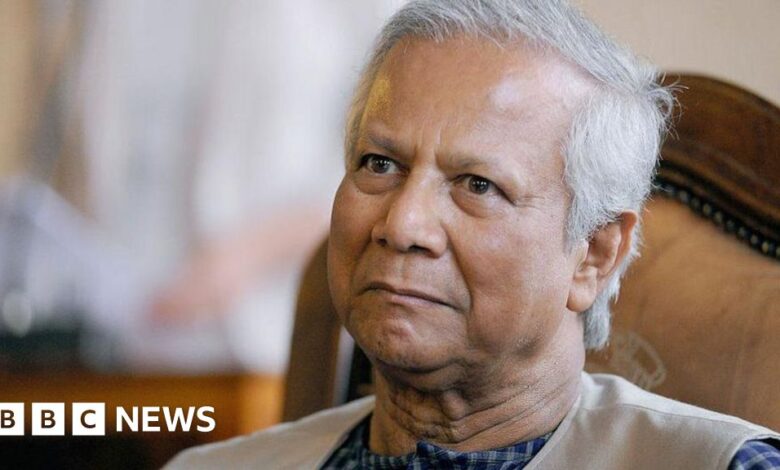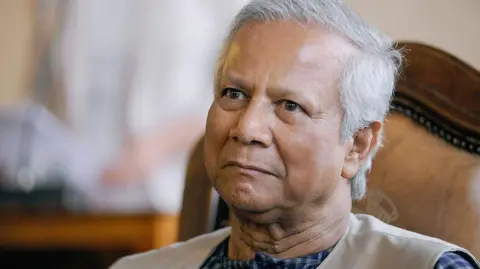Nobel laureate Muhammad Yunus to lead Bangladesh’s interim government

 beautiful pictures
beautiful picturesNobel laureate Muhammad Yunus, a longtime political rival of ousted Bangladeshi prime minister Sheikh Hasina, has been appointed as the country’s interim leader.
The 84-year-old’s appointment as chief adviser to the interim government comes a day after Ms Hasina fled the country following weeks of deadly unrest.
While Professor Yunus is praised for pioneering the use of microloans, Ms Hasina has consider him a public enemy and a local court recently sentenced him to prison in a case he described as politically motivated.
Students leading the protests said they would not accept a military-led government and had pushed for Professor Yunus to lead an interim administration.
The decision to appoint Professor Yunus as chief adviser came after a meeting between President Mohammed Shahabuddin, military leaders and student leaders.
“When students who have sacrificed so much ask me to intervene at this difficult time, how can I refuse?” Professor Yunus said.
His spokesman said he was returning to Dhaka from Paris, where he was undergoing a minor medical procedure.
In 1983, Professor Yunus founded the Grameen Bank, which provides small, long-term loans to help poor people start their own small businesses. The concept has since spread around the world.
In 2006, Professor Yunus and the bank were awarded the Nobel Peace Prize.
He is known to the world as the “bank of the poor”, but Ms Hasina has described him as a “bloodsucker” of the poor and accused his bank of charging exorbitant interest rates.
In January, Professor Yunus sentenced to six months in prison for violating the country’s labor laws by failing to create a welfare fund for workers.
His supporters say the case is politically motivated, while Professor Yunus, who is appealing the verdict, said it “contravenes all precedent and legal logic”.
There are also other cases against him, including tax evasion and working at Grameen Bank after the mandatory retirement age – but Professor Yunus and his lawyers insist these allegations are baseless.
The protests began in early July with peaceful demands from university students to abolish quotas in civil service jobs, but evolved into a broader anti-government movement.
In total, it is believed that more than 400 people have been killed in clashes between government forces and protesters.
More than 100 people were killed in violent clashes across the country on Monday alone, making it the deadliest day since the protests began last month. Hundreds of police stations were also burned.
As protesters stormed and looted the prime minister’s official residence, Ms Hasina fled neighbouring India, ending nearly 15 years of rule.
Prominent opposition figures jailed under her rule, including former prime minister Khaleda Zia and activist Ahmad Bin Quasem, have been released.
Ms Zia is chairwoman of the Bangladesh Nationalist Party, which boycotted the 2014 election and again in 2024, she said. Free and fair elections cannot take place under Ms Hasina..
The 78-year-old served as Bangladesh’s prime minister from 1991 to 1996, but was jailed in 2018 on corruption charges, although she insisted the charges were politically motivated.
Rights groups say Mr Quasem was taken away by security forces in 2016, just one of hundreds of forced disappearances in the country under Ms Hasina’s rule.
Across the border in India, External Affairs Minister S Jaishankar said he was “very concerned until law and order is visibly restored” in Bangladesh, which shares a 4,096-km (2,545-mile) border with India and has close economic and cultural ties.
He gave the first official confirmation that Ms Hasina had requested to come to India “at very short notice” and had subsequently travelled to Delhi.
India also deployed additional troops along the border with Bangladesh.
“Our border guards have also been directed to remain extra vigilant in view of this complex situation,” Mr Jaishankar said.
Foreign leaders have called on Bangladesh to maintain democracy after Professor Yunus’ appointment.
“Any decision the interim government makes must respect democratic principles… to maintain the rule of law. [and] reflects the will of the people,” said US Secretary of State Antony Blinken.
Australian Foreign Minister Penny Wong called on all sides to refrain from violence and “respect universal rights”.
“We call for a full, independent and impartial investigation into the events of recent weeks,” she added.



